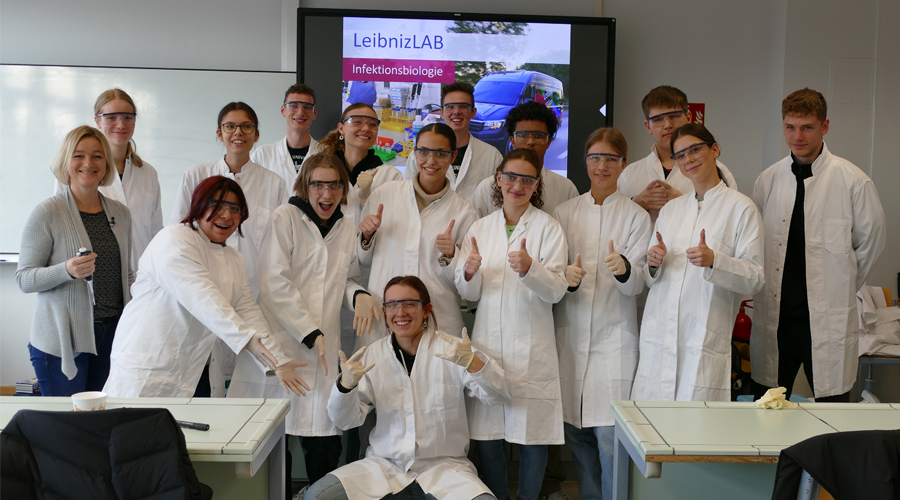As part of the LeibnizLAB at the University of Hanover, RESIST research inspires schoolchildren
What infectious agents are there? How big are they? How do they spread from person to person? The first lecture of the LeibnizLAB of the University of Hanover on the subject of infection biology, which focused on RESIST research, started with very vivid and exciting experiments on these questions as well as on transmission routes of viruses and bacteria and their detection.
At this premiere on November 14, the two Master’s students of Teaching and Plant Biotechnology, Torben and Dorian, presented the LeibnizLab on infection biology, which they designed together with a RESIST team, to eleventh-grade pupils from the Johannes Keppler Gymnasium in Garbsen. Around 15 young people on the advanced biology course learned about new theoretical and practical topics, such as the virus detection method PCR, which can be used to detect and amplify genetic material.
Among other things, they were able to use samples from the MHH to find out whether they contained SARS-CoV-2 viruses. They also learned how to work with a vortexer, pipettes, a centrifuge and a heat block. If a specific question had arisen, they could have called researcher Annett Ziegler in her lab, as she had made herself available as a “telephone joker”.
“This LeibnizLab was a unique experience, very exciting and varied,” said 17-year-old Eylül. “The lab allowed us to gain practical experience in an experimental way. Torben and Dorian are very competent and teach in a relaxed manner,” said 17-year-old Daniel. And his equally young classmate Lia found the experiments “totally exciting” and was delighted with the lab, as something like this would otherwise not be possible in class. Teacher Tina Siuts is also enthusiastic: “The offer is very good because it fits in so well with the lessons. The pupils enjoy learning from Torben and Dorian because they feel very comfortable with them.”
The LeibnizLAB brings exciting scientific experiments from the STEM subjects directly into the classroom so that pupils can experiment independently and learn about scientific work at an early stage. The aim of the visits is to harness pupils’ natural curiosity, to make scientific phenomena tangible and tangible and to get them excited about science and technology! In addition to supplementing lessons, the LeibnizLAB is also suitable for project weeks or similar events as part of the school curriculum.
In this new LAB on infection biology, developed and run by the University of Hanover together with the RESIST Cluster of Excellence, high school students are introduced to the field of infection biology. The offer is free of charge and anyone interested can contact Ina Fedrich from the University of Hanover, telephone: 0511 762 8791, e-mail: ina.fedrichschulprojekte.uni-hannover.de

